-
About Us
Canal Boatmen Family History
Boatmen in the news
Newspapers -Staffordshire
More from Staffordshire
Newspapers - Warwickshire
Newspapers - Birmingham
Newspapers - Leicestershire
Newspapers - Derbyshire
Newspapers - Nottingham
Newspapers - Cheshire
More from Cheshire
Newspapers - Northants
Newspapers - Lancashire
Newspapers - Manchester
Newspapers - Liverpool
Newspapers - Yorkshire
Newspapers - Worcestershire
Newspapers - Gloucestershire
Newspapers - Shropshire
Newspapers - Oxfordshire
Newspapers - Wales
Newspapers - Essex
Newspapers - Kent
Newspapers - London
Censuses
Parish register extracts
Other useful stuff
Contacts, names and photos
Contact
Links
Boatmen in the news

You've probably gathered from the site so far that I have been using newspapers and newspaper archives to give details of the lives of canal boatmen and their way of life. I have also said that boatmen were regarded as "outsiders" and had their own codes of conduct and mores. Water gypsies, I suppose, could sum it up.
Occasionally newspaper articles appear which show very clearly how others regarded these water gypsies. The selection in this part of the site will show this, I hope. Major cases allowed the outside world to shine a spotlight on the lives of the boatmen, and the tenor of the reports suggests they did not like what they saw. Much like the small child who turns over a large stone on the beach, and watches with fascination as the small creatures under it scuttle away!
The first selection of articles are "general interest", the later ones detail specific cases.
Date 1841
A report of a survey carried out regarding Sunday traffic on the canals, and whether Sunday trade should be restrained or even stopped. The language used is definitely far from politically correct to our modern way of thinking. The views of some of the committee members on the boating class are defined by Sir George Chetwynd's description of them as "illiterate, uninstructed and depraved".

Date 1841
An account of a flash flood at Brentford, when the river Brent overflowed its banks. The river water made its way into the Grand Junction Canal, and from there into the Thames, bringing chaos in its wake.
A new word here - "monkey-boats".
Apparently a phrase used only in London, this was a derogatory term used by Thames Waterman and Lightermen to describe the narrowboats which plied their trade on the canals. The name is believed to be derived from one of the early boat builders - Thomas Monk. This is where my family history of narrowboat families meets with my partner's, as his family were Thames Watermen. No such thing as coincidence, according to Jung!
A website which details the building of the Grand Junction Canal (and has some stunning pictures) is www.gerald-massey.org.uk/canal/index.htm.
Date 1844
Two disastrous events which occurred in Nottingham.
Two hundred years ago a public execution was a major event, so the crowds gathered. Now we just have "I'm a Celebrity" and "Big Brother". Plus ca change!
Date 1875
This article is a "must read" for anyone who has boat ancestors in Staffordshire. It features a letter from a correspondent of George Smith of Coalville describing (with horror!) some of the customs of the local Staffordshire boatmen.

Date 1877
Although I picked this article up from the Cheshire Observer, it was syndicated in a great many newspapers around the country. Boatmen were "news" because of the Canal Boats Act. If you can ignore the shock horror overtones of these two articles, there is a lot of information here about boatmen and their lives.
Date 1877/1878
These articles detail the opening of a "Boatman's Bethel", a floating church, at Chester. When I read this, I confess that I rather hoped that my ancestors had given the Boatman's Bethel a miss, and gone to the pub instead.
These floating churches sprang up all over the canal network, with the aim of bringing the boatmen nearer to God. Sunday working meant that boatmen were usually unable to attend church, leading some to believe them to be "unchristian". But again, it was employers who required labour on Sundays, as it made the canal transport system more efficient.
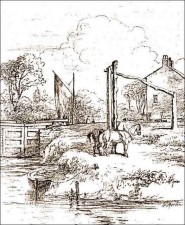
Date 1878
Two articles from the Manchester Courier describing the provisions of the 1878 Canal Boats Act.
The picture is of Stickings Lock on the river Irwell.

Date 1884
A number of articles, including this one, have made mention of the "Conspiracy and Protection of Property Act 1875". This Act, put forward by the Conservative Party headed by Benjamin Disraeli, decriminalised the work of Trade Unions and allowed peaceful picketing. In essence, its principal was that a trade union could not be prosecuted for any act which would be legal if performed by an individual. However, the use of violence and intimidation was not permitted, and serious punishment could be meted out to those who used force and bullying.
Date 1892
As I have said a number of times, boatmen had their own set of rules by which they lived, and when these rules were broken, reactions could be pretty extreme.
Although the names of the couple are not given in this article, there is another article in the Gloucester Citizen which names the woman in the case as Elizabeth Beard. The name of the man concerned, however, is still proving elusive.
There were other methods by which the local populace took the law into their own hands. The following concerns a punishment called "tossing in a blanket" which was meted out in Worcester in 1847 to an elderly lady called Elizabeth King, whose neighbours took exception to the way in which she treated her daughter-in-law. I confess that the connection to boatmen is tenuous - one of the main players, Sarah Dovey, had a sister, Elizabeth Scott, who was married to a boatman - but I have included it here for interest.
***************************************************************************************************************************************
And now some details of specific cases, which are full of interesting detail and information.
***************************************************************************************************************************************
Date 1860
A case of manslaughter in Birmingham. This one is interesting because of the detail it records of how Ned Humphries and Elizabeth Evans spent their last day together.
When Ned was arrested, two other boatmen went to his boat, then accompanied him to the police station. While on the boat, they told Ned that Elizabeth had died, and he cried. A redemption of sorts, I suppose.
Ned Humphries and Elizabeth Evans - a day in the life (70kb)
Date 1863
Not all thefts were petty.
This details an iron stealing "ring" led by Joseph Whitehouse, an ironfounder. One of the cast of characters is Cornelius or "Nealy" Wood, who is referred to throughout as "young Nealy Wood". I think that this was because his father, also a boatman, was called Cornelius Wood too. The name "Cornelius" also appears in the family of Thomas Wood, another canal boatman.

Dates 1864/ 1870
Two articles here. The story of Hannah Green, whose husband sold her for a shilling at the Brummagem Fair, and a rather violent altercation between Mr and Mrs Joseph Mincher of Wolverhampton.
The picture is of Canal Street in Wolverhampton.
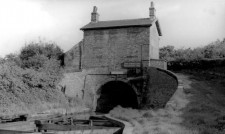
Date 1865
An article from May 1865 detailing the death of Peter Cawley in Preston Brook Tunnel. The tunnel, three quarters of a mile long, was owned by the North Staffordshire Railway Company, and until early 1865 boats had to be "legged" through. The Company then decided to instal a steam tug which could haul a train of boats and so be faster and more efficient. However, the smoke and fumes from the tug often caused the crew to become nauseous and even pass out. The Company were forced to drill air shafts to clear the smoke.
Date 1873
Although this article concerns the death of a boatman, I have included it here because it gives a clue of the conditions in which the urban poor lived at that time. Standards of hygiene were very poor, and there was no real understanding of how disease was spread. All those addresses of ? Court ? Street probably had one of these middens somewhere close. Removal of "night soil" - the polite name for manure - from the city streets to the farms was a constant and perpetual problem.
Date 1874
The drowning of George Edwards, a thirteen year old boy, in Huddersfield. The canal boat passing at the time of the attempted rescue gave the locals a perfect target for blame - the two boatmen, John Swift and Jabez Marsden.
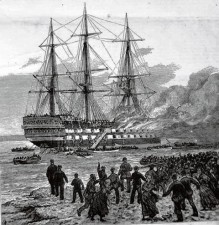
Dates 1875/1901
Information on the Training Ships Goliath and Exmouth, moored in the Thames at Grays. Both ships trained poor London boys for positions in the armed services and the Merchant Navy.
Two articles here. One, dated December 1875, is a contemporary account of the destruction by fire of the TS Goliath at Grays.The second is from the Grays and Tilbury Gazette of December 1901, and records the retirement of Captain Bourchier, the captain of the TS Exmouth, which replaced the Goliath after the accident. Captain Bourchier had also been in charge of the ill-fated Goliath.
The 1901 article includes an eye witness account of the 1875 disaster, written by Mr R J Fenn, who was schoolmaster on the Goliath at the time. There seems to have been an absence of contingency plans in the event of difficulties on board, and it was more by luck than judgement that more boys were not killed or seriously injured.
I had assumed that the boys sent to Training Ships were orphans, Workhouse children or what used to be referred to as "juvenile delinquents", but this was not always the case. After the drowning of Arthur Patrick, one of the boys on the Training Ship Shaftesbury, and Mr Arthur King, the master at arms on the ship, who dived in to try to save the boy, Arthur Patrick's parents were mentioned in the record of the inquest at Gravesend - his father, Charles Patrick was a commercial clerk. I have also found mention in the Shipley Times of boys whose parents refused to send them to school regularly being taken away from home and sent to the Training Ships.
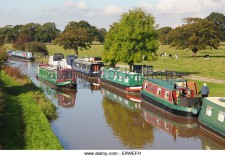
Date 1877
No series of articles shows better the way in which canal families were regarded by some than the case of Charles Moston, who was found dying on the canal towpath in April 1877. The Coroner seemed to have already decided who was to blame, before any evidence had been taken.
This is a lucky find for me, as it details the case from start to finish, and for anyone who has canal ancestors from the Chester area, it is full of interesting detail. It may be long, but bear with it!
Date 1876
A drunken spree, a drowned infant and a hung jury. What else is there to say?
Names : Taylor, Tyrer, Ruen.
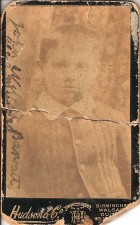
Date 1892
The death of John Willie Barrett, a nine year old boy, who drowned in the canal at Deepfields. Whilst the boatmen in this case may not emerge from it "smelling of roses", they were certainly not deserving of the charge of murder laid against them.
Luckily for them, the court saw it that way too.
Thanks to Albert Barratt for the obviously treasured photograph of young John Willie Barratt.
Dated September 1893, this article details the deaths of Elizabeth and Lily Theobald, two of the children of Thomas Theobald, who were drowned when the boat Willie capsized. Thomas Theobald and his mate, Thomas Ditchfield, were in charge of two boats which were being loaded with soda crystals at Brunner Mond's. The boat was being "trimmed" straight, which meant moving some of the bags of crystals from one side to the other, when she keeled over and sank very suddenly, trapping the two children in the cabin.

Date 1895
This was an article which I felt I had to flag up!!! It made me interested to know about the two parties involved, but so far I have not had much success in finding them on the censuses. Cheshire BMD has an 1895 marriage at Acton between Edward Walker and Sarah Shone, but the absence of any corroborative information makes for uncertainty. Any ideas welcomed.
Date 1899
John Hickson, a flatman, who was found guilty of bigamy. I don't know whether to laugh or cry when I read this article.
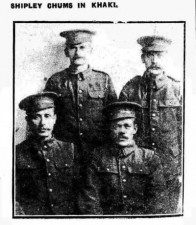
Date 1917
It is often said that the First World War destroyed "the flower of a generation". This article from Shipley brings home the truth of this statement, detailing the wartime experiences of one extended family, the Patchetts, and their "chums". The matter of fact tone of the article makes it all the more poignant.
Last but not least, here are a few articles which didn't fit tidily anywhere else, but were too good to omit. A case of "Canal Rage", a reluctant churchgoer, and a very odd case of counterfeit money.
